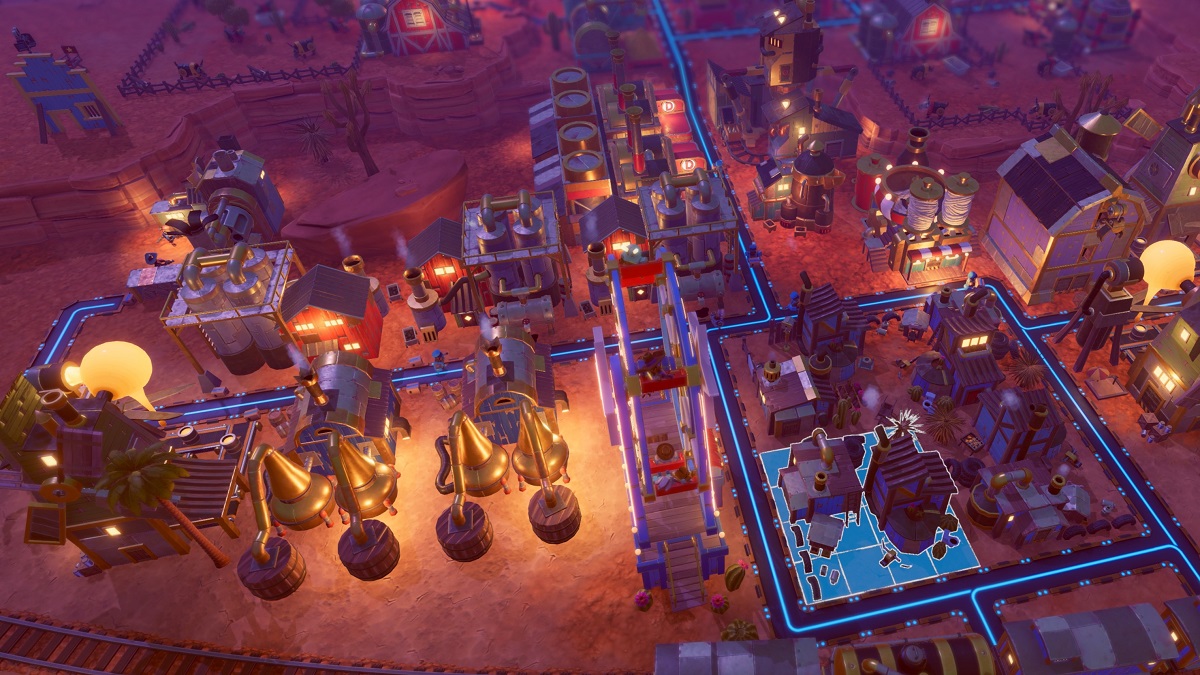In my review of SteamWorld Build, I lament that it doesn’t leave much room for deviation or creativity. In a strange diversion for the genre, it feels like a very linear experience. However, there are ways to optimize your building experience that you may miss, so here are some tips.
Services must cover an area, but warehouses mean production can be anywhere
The main objective of the town-building portion of SteamWorld Build is to make your citizens happy. To do this, they need two things: Services and Resources. Services need to be placed within a specific distance from the houses of your citizens. They need coverage, essentially. If a neighborhood is outside of a service’s reach, you’ll need to place another one to provide coverage to those residences.
On the other hand, resources are available anywhere a warehouse provides coverage. It doesn’t matter if you’re producing plastic on the opposite end of the map. As long as a house has coverage from a warehouse, it will have its needs for that resource fulfilled, which leads me to the next tip.
Create neighborhoods for production
Since production can be anywhere, it’s best to focus it in groups away from your residences. Workers don’t have to live near their jobs, so you get the immediate benefit of not wasting areas with service coverage.
But there’s an added benefit. Once you’ve passed enough milestones (into the Aristocrat level), you can build Steam Furnaces. These boost the production speed of nearby buildings. They also take a great deal of dirty water and charcoal to power, and the one resource that I had the most problems keeping in stock was charcoal. If you cluster your production buildings together, you can power them all with a small number of Steam Furnaces to maximize production.
The only thing you need to ensure your residents are getting their needed resources is a nearby warehouse.
Neighborhoods for citizen types
I want to stress that it is possible to provide every service needed to upgrade citizens fully to every corner of your map in SteamWorld Build, but it’s just not very efficient. You require specific citizens for specific jobs, so you will always need workers and engineers to staff specific roles. You can’t just upgrade everyone and have them aristocrats work in the lumber mill. You will always need a quantity of each citizen type.
So, with that in mind, if you create neighborhoods specifically for a specific type of citizen, you won’t have to worry about providing services to every home in your town. You can have a remote spot for your workers where they have the bare necessities while bathing another part of the town in everything you have to offer.
Always check the train’s stock
A train brings in three items each visit, and each time it rolls back into the station, they get replaced with three more. This is largely random, so you’re going to want to check each time you’re alerted to its arrival to see if there’s something you want. In particular, you’re going to want to grab the Warehouse Expansion item whenever you can afford this. Adding this to any warehouse will increase your maximum storage capacity for all items by 25. If you have any big construction project going on, you’ll often find yourself short of resources, and a bigger stockpile can avoid these holdups.
On the other hand, you can also trade money and resources with the train. I never found this more bothersome than just improving infrastructure, but maybe you’ll find better value in it.

Better roads improve coverage
As you progress through the milestones, you start unlocking more types of roads, starting with Dirt Roads, then Paved Roads, and finally Maglev Roads. On the surface, better roads make your haulers move faster to and from warehouses, but the biggest advantage is that they extend the reach of your facilities. This means you get more coverage without having to add more. You can (maybe) see what I mean in the image above. The top is the Dirt Road, and the bottom is Maglev. What I’m saying is that it’s worth upgrading your roads.

Watch for tumbleweeds
Tumbleweeds are balls of junk that go rolling through the desert before getting stuck on something (maybe a building). What you might not have tried is clicking on them. If you click on a tumbleweed in SteamWorld Build, it will break open, and you’ll get a random resource. Sometimes, that isn’t helpful, but occasionally (more often than not in my experience), you’ll wind up with rubies. Rubies are one of the most finite and hardest-to-obtain resources in the game, so any additional ones you can pocket are great to have.
Use conveyor belts to automate mining
The best thing you’ll find on the second floor of the mine (or perhaps the entire game) is the conveyor belt. With these, you can link equipment that is digging up resources to your elevator and completely automate them. This means prospectors don’t have to keep hauling crates around. You can just set them up and forget them. After you link up every resource on a floor to the elevator, you can practically forget that the floor even exists. They aren’t difficult to set up. You just need a clear path to the elevator. If there’s something in your way, it is absolutely worth bulldozing it.

You can stack equipment on mine facilities
As you search the mines and buy from the train, you’ll start obtaining equipment that can be added to mining facilities. However, you might wonder what good a single rifle is within your hordes of guard robots. Thankfully, it doesn’t have to be a single rifle. If you have more than one of any equipment (say, a rifle), you can stack them on a single facility. This means you can have two rifles or, dare I dream, three rifles.





